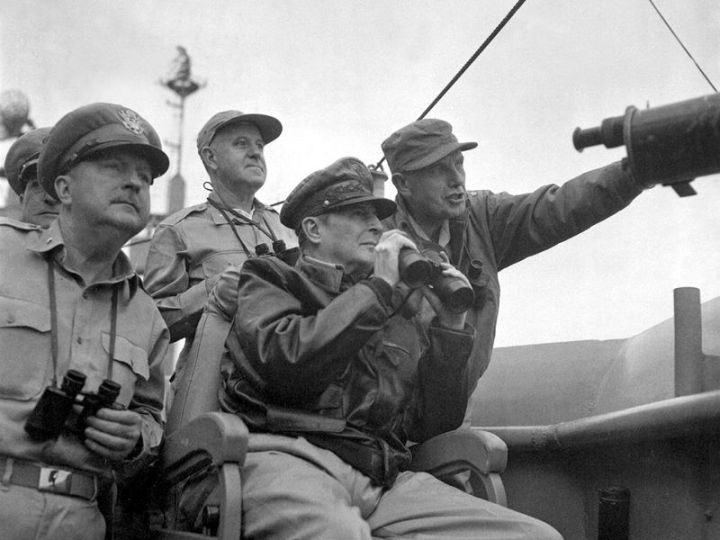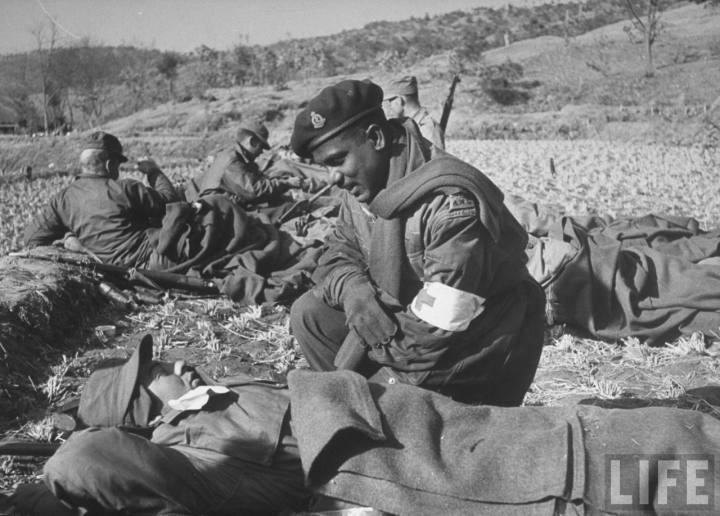KIMCHI AND MASALA
A lowdown, on India’s view of the Korean peninsula. Its historical underpinnings and the latest churning, their impacts and possibilities.
At the outset this piece may seem a fusion foodies paradise to have the most popular Korean export and the famous Indian spices, But the ambit is far wider and seeks to look upon the latest churning going on in the Korean peninsula, its larger global implications for the world as a whole, East Asia in general and India in particular.
 The US General Mc Arthur during the Korean war
The US General Mc Arthur during the Korean war
Ever since the years of Korean war where the two blocks (The US and Communist) fought by keeping their rifles on the Korean’s back, a lot of water has flown in the Yalu. General Douglas Mc Arthur landed on the Korean peninsula in the middle of the Korean crisis and since then American boots haven’t left the land. On the other hand, the Chinese (and the larger communist bloc aided by the Soviet union) who grabbed the opportune moment to further their geopolitical interests ventured into the conflict. All of it resulting in a hanging ceasefire and a military stalemate cemented by an armistice agreement, indicating that the peninsula would continue to remain the playground for the global power play. Over the years, with the waning of Soviet bloc and it’s dissolution, china has taken the pole position to fasten itself on the other end of this global roulette. China continues to use DPRK or North Korea as leverage in global affairs with the west in general and US in particular.
The latest turn of global events with the summit of US president Trump and DPRK’s Kim Jong Un has once again turned the global eyeballs looking at the Region with renewed interest, apprehension and anxiety. Even at the summit, the elephant in the room was China as before and after the summit the supreme leader paid visits to the regime’s(DPRK) guardians in Beijing and his arrival on a China-flagged plane speaks volumes how the route to peace in the region goes through China.
THE INDIAN CONNECTION
Though India has had historical cultural ties with Korea, modern ties go back to almost middle of the 20th century when the Korean war was fought. In a UN-brokered armistice (July 1953) Indian forces were stationed to maintain order and compliance.
 Indian peacekeeper in Korea
Indian peacekeeper in Korea
Over the years successive Indian governments continued the engagement with the two Koreas. But India’s relationship with the region has primarily centered around South Korea(Republic of Korea i.e. ROK) while continuing to have small trade and humanitarian assistance to the North (DPRK). The recent visit the ROK’s MOON Jae IN to India and the revision of CEPA – Comprehensive Economic Partnership agreement stands testimony to the growing interest of India in the region and its place as a stakeholder in the Region. New Delhi was quick and smart enough to pick up the global headwinds and sent Gen(Ret) VK Singh its deputy Foreign Minister in May,2018 to the DPRK, India continues to be amongst a few nations to have a full-fledged embassy at Pyongyang and has often played a far more discreet yet important role in the region since the 1950s, be it aiding the backchannel diplomacy, using its good offices to broker understanding among Zhau En Lai of China and the US when Indian embassy at Beijing used to be a buzzing place during war years.

 Indian PM and ROK’s President Gen VK Singh in Pyongyang
Indian PM and ROK’s President Gen VK Singh in Pyongyang
Impact of latest Events- The Indian Angle
As India is not merely looking east but acting east, the latest turn of events holds great significance for India as a stable peninsula is in Indian interest. The booming economy and trade relations with the south as well as with the region at large benefits from this peace. On the Strategic front, the hideous DPRK and Pakistan nuclear nexus tends to wane with the mainstreaming of the DPRK’s position in the international arena. Though the opening up of North Korea will result in direct benefits to China, as it can let loose its buffer but won’t let it go away altogether, India can’t be far behind in grabbing its share of the pie in terms of new space for trade investments and market.
So long North Korea remains an international pariah. It will continue to be an Achilles’ heel for the world and a prick for India due to the unholy axis of Pakistan and DPRK as well as a bargaining chip in hands of China with the west.
India must play its card right in this fast-changing global power play and rapidly altering regional equations to benefit from these global headwinds the most. While it should continue to use its soft power on the global high table and balance its relationship with the west and their Asian allies, It must engage with the North to secure its interest. As the famous dictum goes “In international affairs, there are no permanent friends and enemies but only permanent interests.”
Article by: Abhishiekh Saxena
Foreign policy and strategic affairs enthusiast
